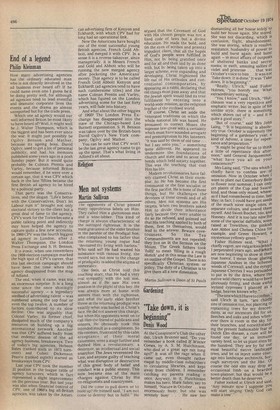End of a legend'
Philip Kleinman
How many advertising agencies has the ordinary educated man who is not directly involved in the ad business ever heard of? If he could name even one [guess he'd be doing pretty well, for although ad agencies tend to lead eventful and dramatic corporate lives the events and the drama go almost unreported but for the trade press.
Which one ad agency would our well informed Briton be most likely to have heard of? Well, it might well be J. Walter Thompson, which is ' the biggest and has been ever since the war. It might just possibly be Ogilvy Benson and Mather, because its ageing boss, David Ogilvy, used to get a lot of personal publicity, and had his memoirs published some years ago in a posh Sunday paper. But it would quite probably be Colman Prentis and Varley, because informed Briton would remember, if he were over a certain age, that it was CPV which back in the late 'fifties became the first British ad agency to be hired by a political party.
That party was the Conservatives, and the slogan "Life's better with the Conservatives, Don't let Labour ruin it" brought not only electoral victory to the client but a great deal of fame to the agency. CPV's work for the Tories became a public talking point and indirectly may have helped the agency to capture quite a few new accounts. In 1960 CPV was the fourth biggest ad agency in London, after J. Walter Thompson, the London Press Exchange and S. H. Benson.
It is ironic, when one remembers the 1959 election campaign marked the high spot of CPV's career, that this last election campaign should have been the time when the agency disappeared from the map of Adland.
The end, when it came, was not an enormous surprise. It is a long time since the once shiningly successful agency — a legendary seedbed of advertising talent — was numbered among the top four or even the top twelve. A number of factors contributed to its slow decline. One was arguably that Colonel Varley, its former chief, dissipated much of the company's resources on building up a big international network. Another was that CPV suffered badly from that endemic disease of the ad agency business, breakaways. Two of today's big agencies, Hobson Bates (ranked sixth in 1973 turnover) and Collett Dickenson Pearce (ranked eighth) started as breakaways from CPV.
Last year CPV took the number 21 position in the league table of agency turnovers, which in fact represented a slight improvement on the previous year. But last year was also when financial control of CPV, one of 1960's big all-British agencies, was taken by the Ameri
can advertising firm of Kenyon and Eckhardt, with which CPV had for long had an operational link.
Now the Americans have bought one of the most successful young British agencies, French Gold Abbott, and merged it with CPV. In a sense it is a reverse takeover, since managerially, it is Messrs French and Gold and Abbott who will be running the new merged agency after pocketing the Americans' money. That agency is to be called French Gold Abbott Kenyon and Eckhardt (ad agencies tend to have such cumbersome titles) and the name Colman Prentis and Varley, which has figured on the London advertising scene for the last forty years, will fade into history.
And what about the other biggies of 1960? The London Press Exchange has disappeared into the maw of the Chicago-based Leo Burnett organisation. S. H. Benson was taken over by the British-born David Ogilvy's New York company, Ogilvy and Mather. You can be sure that CPV won't be the last great agency name to go up the spout. That's what living in Adland's all about.


































 Previous page
Previous page